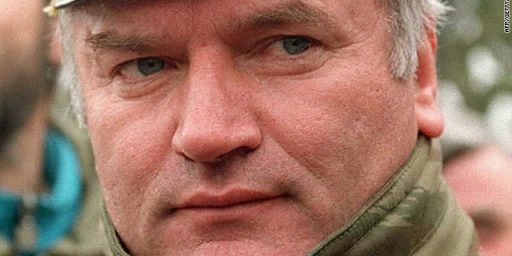A Decade Later, Srebrenica Continues to Haunt
Tomorrow marks the tenth anniversary of the Srebrenica Massacre, prompting appropriate remembrances in the press. The Australian starts with the grave failures of the United Nations, particularly Kofi Annan:
Annan was in charge of UN peacekeeping operations in 1995 when Serbian forces led by General Ratko Mladic entered the so-called UN “safe area” and in front of a force of 600 Dutch blue helmets, began rounding up Muslim men and boys for the wholesale slaughter that lay just ahead.
As head of peacekeeping, Annan had been part of the UN leadership that considered the option of sending NATO air power against the advancing Serbs. The final decision not to militarily confront the Serbs – despite repeated requests for close air support from the Dutch commander – amounted to a death sentence for thousands.
[…]
“The tragedy of Srebrenica will haunt our history forever,” Annan concluded. “The cardinal lesson of Srebrenica is that a deliberate and systematic attempt to terrorise, expel or murder an entire people must be met decisively with all necessary means.[“]
R. Nicholas Burns, the Undersecretary of State for Political Affairs, explains what must now be done to close this harrowing chapter:
Unfinished Balkan Business (WaPo)
The United States is sending a presidential delegation to mourn the victims of this war crime. An important question is, who will represent the Serbs? Serbian President Boris Tadic has offered to attend, along with leaders of his country. A clear statement of contrition on behalf of the Serbs would be the best step toward regional reconciliation. An even more dramatic and fitting gesture would be the arrest and extradition to the War Crimes Tribunal in The Hague of Gen. Ratko Mladic, who ordered the murders. I told President Tadic and Prime Minister Vojislav Kostunica in Belgrade recently that the United States is prepared to undertake a new and expanded relationship if they capture Mladic. They say they are willing. Let us all hope so. I also told them that until he is brought to justice in The Hague, the United States will not support their wish to join NATO’s Partnership for Peace. The Balkans cannot return to normality until the stain of Srebrenica is wiped away.
The Boston Globe combines the two themes in a solid editorial:
[…] The failure of Dutch soldiers in a UN peacekeeping contingent to protect the victims left a stain on the reputation of the United Nations. What has become yet more of a humiliation for the international community is the failure, after a decade, to arrest the two men responsible for the slaughter and deliver them to the International Criminal Tribunal for the former Yugoslavia in The Hague, where they stand accused of genocide and crimes against humanity.
The troops doing the killing were led by General Ratko Mladic, acting under orders from the Bosnian Serb government headed by Radovan Karadzic. As long as Mladic and Karadzic remain at large, genocidal killers elsewhere — such as members of the Sudanese government behind the continuing genocide in Darfur — may assume that they, too, can expect impunity. Muslims around the world will be tempted to regard the two fugitives as evidence that the West is not serious about enforcing a universal standard for the punishment of crimes against humanity, particularly when the victims are Muslim.
But the most noteworthy piece comes from Edward Joseph, who served in the Balkans from 1992 to 2003. He lists three lessons from his experiences:
Bystanders To a Massacre (WaPo)
First, not all those who enter the world of peacekeeping and nation building do so out of noble motives. The U.N. is hardly the only international organization that attracts people (particularly from countries with limited opportunities) who are motivated, instead, by the pay, which is reliable and relatively high. Even Westerners often decide whether to join a U.N. or other mission after checking out the level of the per diem, which is often taken as tax-free income. Someone who is primarily interested in financial or career gains is unlikely to rock the boat, even if it’s flagrantly off course.[…]
Second, even the vast majority who are motivated by the desire to do good may still find their principles compromised or confused by organizational loyalty. Many on the staff of the senior U.N. official in the former Yugoslavia, the Japanese diplomat Yasushi Akashi, internalized his overarching priority: to protect the U.N.’s neutrality and “even-handedness” by avoiding the use of force against the Serbs.[…]
Like so many on the U.N. staff, the headquarters official had put protecting the organization above protecting civilians. Ironically, such action instead left the U.N.’s reputation in tatters. Unfortunately, senior U.N. officials still peddle the line that the Secretariat was merely the “servant” of a divided Security Council that failed to provide the U.N. with enough resources in Srebrenica. In fact, the Secretariat independently resisted any use of force in Bosnia, including NATO airpower that could have more than compensated for shortfalls on the ground. For the sake of current and future U.N. missions, it is essential that the organization not turn explanations about Srebrenica into excuses.
The third and least understood factor in collective passivity toward evil is the prevalent taboo against “getting emotional” about death and tragedy. While there is always a risk of rushing to judgment or allowing particularly graphic evidence to cloud decision-making, the greater risk is from exaggerated clinical detachment. Without a sense of guided outrage, of empathy for the victims of abuse, organization staff, even human rights workers, are prone to “move on” and accept it when bureaucracies shrug their shoulders.
Absolutely.
In June, after Serbia and Montenegro transferred twelve indictees to the Hague, the State Department released $10 million of previously-withheld aid. Such cooperation certainly needed to be recognized (whether through financial assistance or some other channel). But, at this point, I wonder how the Bush administration plans to entice Tadic’s government to make additional efforts to extradite Mladic and other high-profile war criminals. Does it intend to increase aid? Does it have other ideas? Burns doesn’t specify the next course of action, yet it may be the most important part of finally achieving justice.
Update: The BBC reports that a “new Srebrenica grave” has been discovered.





